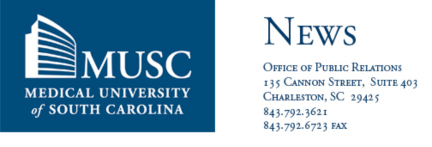
March 28, 2011
CHARLESTON -- FirstString Research, Inc., a biotechnology company sprung from a Medical University of South Carolina (MUSC) lab, has received two patents for intellectual property protection for further development and commercialization of its regenerative medicine technology, according to FirstString Research President and CEO Dr. Gautam Ghatnekar and MUSC scientist and FirstString Scientific Advisory Board member Dr. Robert Gourdie.
The first patent issued late last year was a "composition of matter" patent for a regenerative technology platform invented in an MUSC lab by Gourdie, Ghatnekar and lab manager Jane Jourdan. The technology's first application takes the form of a wound-healing/scar-reduction peptide gel by FirstString Research. The second patent, issued this month, is a "methods of use" patent, meaning that the peptide-gel can be used for multiple medical applications. Both patents provide protection and exclusivity through 2026.
"The issuance of these patents consisting of broad composition and use claims gives FirstString important and fundamental assets to build not just its first commercial application in wound-healing and scar reduction, but the entire platform for other uses, such as spinal cord injury, cardiac injury, corneal injury and age-related macular degeneration," Ghatnekar said.
Galvanized by the award of these two patents and positive Phase I human trial results in Switzerland, FirstString plans to launch a Phase II clinical trials with more than 270 patients in 2011, pending regulatory approval. These trials will further test two topical functions of the wound-healing peptide gel: faster healing of difficult to heal wounds such as diabetic foot and venous leg ulcers and reduction of scars associated with surgical wounds. Eventual commercialization of this work could lead to decreased medical costs related to these conditions and enhanced quality of life.
"The clinical progress made by FirstString exemplifies MUSC's increasing effort and commitment to translate breakthrough laboratory research into clinical applications that further solidify its role as an important partner for entrepreneurial companies seeking to explore new economic development opportunities in the biotech sector," said Ghatnekar. "We are delighted that our patents have been approved, and are incredibly excited about its impact on patients who will benefit from the multiple applications of this regenerative medicine technology."
The peptide was originally developed by Gourdie in his lab at MUSC for use as a laboratory tool in understanding electronic signaling within heart muscles and was further developed by Ghatnekar to have translational benefits at the bedside. Ghatnekar realized the peptide's potential to decrease scar tissue and heal wounds faster in laboratory animals when he worked as a postdoctoral fellow in Gourdie's lab. After the additional application was considered for the peptide, the group developed a topical gel that was shown to decrease scar tissue and heal wounds faster in laboratory mice. Subsequently, this led to the formation of FirstString by Ghatnekar and Gourdie.
The peptide works by inhibiting the production of scar tissue and catalyzing the production of new tissue to heal a wound, similar to how a lizard might re-grow its tail if it were injured. The discovery in Gourdie's laboratory of the peptide's ability to reduce scar tissue, while also promoting heart cell electrical function, turned into a two-for-one exchange. The peptide is also being developed for translational uses in heart and spinal injury patients, as well as those who suffer from macular degeneration or cardiac arrhythmias.
"Sometimes you start out on one path and you are surprised at the unexpected observations that can become the breakthrough in another direction," Gourdie said. "This peptide has proven itself to be a platform technology for a variety of ongoing internal and external applications in the human body."
This collaborative pipeline of biotechnology involving MUSC and FirstString serves as a successful model of how academic medical centers can produce spin-off companies to improve human health. As FirstString pursues commercialization of the peptide for several clinical uses, Gourdie's lab will continue to work on additional promising internal applications such as the peptide's anti-arrhythmia effects, and its use for other cardiac and spinal injuries.
About MUSC
Founded in 1824 in Charleston, The Medical University of South Carolina is the oldest medical school in the South. Today, MUSC continues the tradition of excellence in education, research, and patient care. MUSC educates and trains more than 3,000 students and residents, and has nearly 11,000 employees, including 1,500 faculty members. As the largest non-federal employer in Charleston, the university and its affiliates have collective annual budgets in excess of $1.7 billion. MUSC operates a 750-bed medical center, which includes a nationally recognized Children's Hospital, the Ashley River Tower (cardiovascular, digestive disease, and surgical oncology), and a leading Institute of Psychiatry. For more information on academic information or clinical services, visit www.musc.edu or www.muschealth.com.
#####